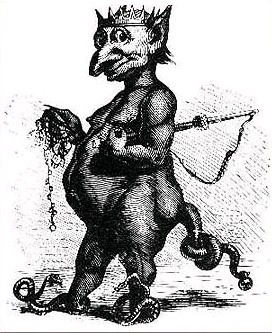| File:Document stub.png | This article is a stub. It may be incomplete, unfinished, or have missing parts/sections. If the article can be expanded, please do so! There may be suggestions on its talk page. (Date?) |
Element/sin : Sun
Shape : a fat-bellied character with the head of a king, a dragon's tail, and serpents instead of legs. He also carries a whip in his hand. He is often featured with the head of a cock.
Rank : the ruler of all the 365 heavens (Basilides of Egypt)
Origin : Gnostic. Express the unspeakable name of the Supreme Being and to symbolize its solar power.
Magic : The seven letters of his name signify the seven creative powers, or the seven planetary angels, recognized by the ancients. In numerology, the value of the letters in Abraxas adds up to three hundred and sixty-five, the number of days (365) and powers of the year, and the three hundred and sixty-five spirits occupying the heavens. The name Abraxas seems also to have been the origin of the word 'abracadabra,' a magic spell said to be of very great power.
Afterwards broke out the heretic Basilides. He affirms that there is a supreme Deity, by name Abraxas, by whom was created Mind, which in Greek he calls Nous; that thence sprang the Word; that of Him issued Providence, Virtue, and Wisdom; that out of these subsequently were made Principalities, powers, and Angels; that there ensued infinite issues and processions of angels; that by these angels 365 heavens were formed, and the world, in honour of Abraxas, whose name, if computed, has in itself this number. Now, among the last of the angels, those who made this world, he places the God of the Jews latest, that is, the God of the Law and of the Prophets, whom he denies to be a God, but affirms to be an angel. To him, he says, was allotted the seed of Abraham, and accordingly he it was who transferred the sons of Israel from the land of Egypt into the land of Canaan; affirming him to be turbulent above the other angels, and accordingly given to the frequent arousing of seditions and wars, yes, and the shedding of human blood. Christ, moreover, he affirms to have been sent, not by this maker of the world, but by the above-named Abraxas; and to have come in a phantasm, and been destitute of the substance of flesh: that it was not He who suffered among the Jews, but that Simon was crucified in His stead: whence, again, there must be no believing on him who was crucified, lest one confess to having believed on Simon. Martyrdoms, he says, are not to be endured. The resurrection of the flesh he strenuously impugns, affirming that salvation has not been promised to bodies.
(Tertullian)
Abraxas speaketh that hallowed and accursed word which is life and death at the same time. Abraxas begetteth truth and lying, good and evil, light and darkness in the same word and in the same act. Wherefore is Abraxas terrible.
(Carl Jung "the Seven Sermons To The Dead")
Abrasax represented the 365 Aeons or emanations from the First Cause, and as a Pantheus, i.e. All-God, he appears on the amulets with the head of a cock (Phoebus) or of a lion (Ra or Mithras), the body of a man, and his legs are serpents which terminate in scorpions, types of the Agathodaimon. In his right hand he grasps a club, or a flail, and in his left is a round or oval shield.
(E. A. Wallis Budge)

